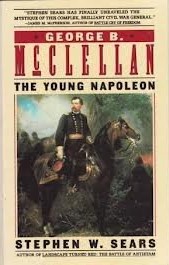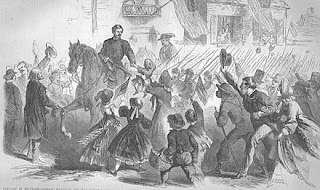Terrible military leaders grab history’s attention like a car wreck on the highway, albeit with a much higher body count. Whether as monuments of supreme idiocy or just poor luck, they live on in a way only the best of the good leaders do.
Think of Custer or Crassus or Conrad von Hötzendorf, who all married bad judgment and wanton disregard for life to leave us eternal reminders of the folly of war. There are others not as spectacular but every bit as deadly.
Take, for example, George McClellan, whose leadership can be blamed for extending the U. S. Civil War. This at least is the impression left by Stephen W. Sears in this biography of McClellan.
Awful military leaders often stand out for blind risk-taking, indifference to casualties, and lack of judgment. George McClellan had a different fatal flaw. As his boss Abraham Lincoln famously put it, McClellan suffered from a case of “the slows.”
Early in the war, McClellan explained his military philosophy to a governor. “There is only one safe rule in war – i. e. to decide what is the very worst thing that can happen to you, & prepare to meet it.”
Which actually doesn’t strike me as that bad a plan. Not until I read George McClellan: The Young Napoleon and discovered just how self-defeating a strategy of defeat avoidance can be.
Many know McClellan as the Union commander of Antietam, long the bloodiest day in American history. Despite holding lost Confederate battle plans and a decided advantage in total troops, he managed just a draw against the far more energetic Confederal General Robert E. Lee, losing more soldiers than his outnumbered foe.
Sears explains: When making war, General George Brinton McClellan was a man possessed by demons and delusions. He believed himself to be God’s chosen instrument for saving the Union. When he lost the courage to fight, as he did in every battle, he believed he was preserving his army to fight the next time on another and better day.
Sears may go too far naming what can be better termed a want of hardness, but he makes a good case that McClellan was just what the North did not need at the dawn of a long and bruising conflict, a chronic ditherer whose failure to attack extended the human toll for both sides.
McClellan had all the right stuff a peacetime army could want from a commander. He was smart, proper in his conduct, with a firm grasp of duty and all the right connections. Other than being a bit short, he looked the part, and in fact, his stature gave him a humanizing aspect, as he was dubbed “Little Mac.” Like many leaders of his day, he styled himself on Napoleon, who was famously short, too.
He even scored an early victory, the first one of any significance for the Northern side, at Rich Mountain, which incidentally secured the statehood of West Virginia. Sears shows how this minor win was blown out of context; for his part McClellan stayed far away from the fighting, inserted troops in piecemeal fashion, failed to adjust at crucial moments, and was unwilling to aggressively pursue a weaker foe. After the battle, he blasted subordinates who had done the actual fighting.
According to Sears, it established a pattern: Behind the recriminations was the fact that in this first test as a battlefield commander McClellan took resort in caution when his plan miscarried, leaving a portion of his army in possible peril.
During his first big move as commander of the North’s main force against the Confederate capital at Richmond, in what became known as the Peninsula Campaign, McClellan again moved with tremendous deliberation, allowing his opponents to maintain the vital initiative.
Sears describes how Lee played McClellan like a fiddle by sending attack after attack. McClellan’s troops got the better of most of these, yet Little Mac was left intimidated and exhausted, a common condition of his after a battle. Of Lee, Sears notes: “In his offensive he would make his target McClellan himself as much as McClellan’s army.”
Even after scoring an overwhelming defensive victory at Malvern Hill, McClellan could do no more after his Peninsula campaign than sit pat and complain bitterly about not having more men. He railed at Edwin Stanton, the Secretary of War: “If I save this Army now I tell you plainly that I owe no thanks to you or any other persons in Washington – you have done your best to sacrifice this Army.” [An officer at the telegraph office removed that dig, recognizing it as an accusation of treason.]
Through the summer of 1862, McClellan held a corner of Virginia while another Union force a couple days’ march away from him got thrashed. Lee correctly counted on McClellan’s inertness when jumping this Union army at Manassas, under McClellan’s rival John Pope:
In short, had General McClellan willed it, 25,000 reinforcements would have been at General Pope’s call in time for the fighting on August 30, the second and decisive day of the Second Battle of Bull Run.
Worse followed in September 1862, when McClellan followed Lee into the border state of Maryland. Even after uncovering enemy plans that revealed just how and where Lee would divide his smaller force, McClellan moved slowly, imagining as he always did an adversary of well over 100,000 troops (on his best day, Lee could field just over a third that number.) Lee was given ample time to invest and capture a Union force at Harper’s Ferry before reuniting his troops at Sharpsburg, Maryland, along the Antietam Creek and an epic showdown.
Some of this fog of war came from Mac’s intelligence chief, Allan Pinkerton, some from cavalry commander Alfred Pleasanton who knew what to tell his boss. Ultimately Sears blames McClellan for believing what he wanted in order to justify his unwillingness to fight.
Some contemporaries suggested McClellan was deliberately holding back because he did not agree with Lincoln’s war aims and did not want to facilitate them with a quick victory. Sears agrees McClellan hated Lincoln’s wartime policy, particularly the emancipation of slaves, and privately called the President a “gorilla,” but insists he was no traitor:
There is no credible evidence that George McClellan was anything less than completely patriotic and loyal to the Union cause, yet there is no small irony in the fact that his obsessive caution on campaign and his repeated loss of will in battle produced exactly the effect of a conspiracy to gain a compromise peace.
How did McClellan last so long as the North’s chief commander? Sears sheds less light on this than he does the man’s ineffectiveness; it is a significant failing of this book.
Sears begins with an analysis of McClellan’s days as a plebe at West Point and as a staff officer in the Mexican War. There Sears observes two traits that would serve McClellan poorly in his career, a contempt for civilians and a rigidity about believing what he wanted.
“I don’t care much for anybody’s opinion, as long as I’m in the right,” he once claimed.
Sears draws heavily from McClellan’s own memoir of his Civil War service – left unfinished like so much else when it came to McClellan and war – as well as his many letters to his wife, Mary Ellen [in other accounts, Ellen Mary], to whom he poured out his heart, his soul, and what passed for his strategy.
Sears shows little interest in McClellan’s relationship to his wife. The more I read, the more I found myself thinking this was a key to his character. The man loved his wife, clearly, and cared more about her opinion than anyone else’s. “He kept nothing from Ellen that he did not keep from himself,” Sears notes.
Sears sees McClellan’s adoption of Ellen’s Calvinism as a problem for him as commander, breeding a “fatalism” that made him prone to seeing critics as adversaries. But he doesn’t probe their marriage, or register anything else that personal about the man. There is little flavor of the times McClellan lived in, or the people he knew and fought. Even Lincoln is a bit of a stick, if an amusing one for the way he railed about the Army of the Potomac being “McClellan’s bodyguard.”
McClellan was finally dismissed by Lincoln almost two months after Antietam. He then tried his hand at politics, as the Democratic nominee for President. At least here his ineptitude helped the Union war effort, allowing Lincoln a safe re-election so he could focus on victory.
McClellan was hobbled by his party’s peace-at-any-price platform that was no longer in 1864 the selling point it had been. McClellan himself rejected Southern secession, and what little energy he expended was often spent explaining where he differed from his key supporters. “...yet reunion was his sole condition for peace,” Sears notes.
After losing, he lived in Europe for a while, became a one-term governor of New Jersey, and continually carped about how poorly he had been served by others above and below him.
Sears’s book works best when analyzing McClellan’s battlefield mistakes, though he covers most of that territory to better effect in his other books, the fantastic Landscape Turned Red about Antietam as well as his later account of McClellan’s Peninsula Campaign, To The Gates Of Richmond. Sears has the right angle on what made McClellan a terrible commander, but the focus of a biographer needs to be broader.
My theory is Sears’s time studying the bloody
results of McClellan’s ineptitude at Antietam made it hard to see the general
as anything other than an awful mistake. Car wrecks don’t make for appealing
subjects. I appreciated the sharp military analysis, but found I missed any
sense of a personal dimension more than I enjoyed the points being scored.







No comments:
Post a Comment